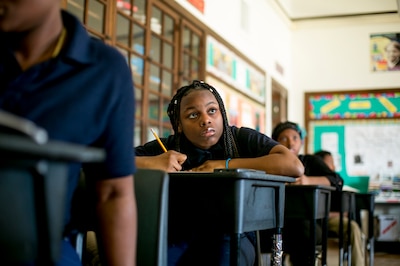Sign up for Chalkbeat Detroit’s free daily newsletter to keep up with the city’s public school system and Michigan education policy.
A new presidential administration, a Detroit schools’ lawsuit against the state, and continued attendance woes are among Michigan’s education issues that will likely make big news in 2025.
Last year was marked by a federal investigation that found Michigan education officials failed students with disabilities during the pandemic, as well as a new law that requires Michigan schools use the science of reading in literacy instruction. There was also a crucial Detroit school board election, and a lame duck legislative session that fizzled and left some big education bills on the table.
Here’s what we’ll be following this year. Did we miss anything? Feel free to let us know at detroit.tips@chalkbeat.org.
How will Trump’s second term impact Michigan schools?
During his campaign, Donald Trump indicated he wanted to eradicate the U.S. Department of Education.
Most experts and political observers think that probably won’t happen. But a bill that would reassign the agency’s functions to other departments has already been introduced by a Republican senator. Trump’s administration could also strip the department of funding and replace its career employees with political appointees.
Changes to the Education Department could also drastically alter the enforcement of federal civil rights laws in local schools.

The Michigan Department of Education is currently fighting scrutiny from the federal department’s Office for Civil Rights for alleged violations of students with disabilities’ rights during COVID-era school closures.
The Michigan department denies all the claims. Federal officials said previously the outcome of the case will be decided in an administrative hearing.
Trump will also likely rescind new Title IX regulations that protect transgender students from discrimination. (The Biden administration recently rescinded proposed Title IX rules specifically concerning athletics.)
DPSCD goes to court over millage revenue dispute
After years of relative stability, the Detroit Public Schools Community District has initiated a court battle that could affect its financial stability.
The district sued the Michigan Department of Treasury and State Treasurer Rachael Eubanks in late December to resolve a dispute between the two over whether the district can use revenue from an operating millage to pay off some of the massive debt that remains from Detroit Public Schools, the entity that used to educate students.
The dispute requires revisiting the 2016 legislative deal that created DPSCD and gave schools in the city district a fresh, debt-free start using state funding. DPS remained intact to collect tax revenue to pay off the debt that crippled DPS. Much of the debt was accrued during years the state oversaw the district via emergency managers who were appointed by the state.
The split had been going well. The district expects to pay off its operating debt in February, 18 months earlier than expected. But that is where the dispute begins.
With that debt paid off, DPSCD officials expected to use its operating millage revenue to help pay off its remaining debt: $355 million in debt to the state School Loan Revolving Fund and another $1.3 billion in capital debt. A separate DPS debt millage has been used to pay down that roughly $1.7 billion in debt, but using the operating millage would mean that remaining debt could be paid off in eight years, rather than 15.
But Michigan’s treasury department says the operating millage revenue cannot be used to pay off debt that doesn’t stem from operating costs. The department also says that DPS must discontinue the millage once the operating debt is paid off, that DPSCD must ask voters to approve a new operating millage, and that the state will no longer provide the district with operating funds.
The treasury department’s stance would mean more than $300 million in increased interest costs for the district’s capital and revolving fund debt, due to the repayment timeline of 15 years instead of eight. It could also put the district in financial peril if DPSCD voters reject a proposed new operating millage.
Immigration arrests at schools might return under Trump
Schools have been considered “sensitive” or “protected” areas under federal immigration policy for nearly 30 years. This meant immigration arrests generally did not happen at or nearby schools.
But Trump is expected to end that policy soon after he returns to office.
Advocates for immigrant children and educators fear this will disrupt learning for millions of students in the U.S. with undocumented parents. They say parents will no longer trust schools, potentially prompting many to no longer bring their kids to school or to participate in their education.
During Trump’s first term, the Detroit Public Schools Community District adopted a new policy to protect immigrants’ rights on school grounds.
What will Democrats’ loss of control mean?
Michigan Democrats lost control of the House at the beginning of 2025, ending their short-lived control of state government.
Absent bipartisan deals, Democrats will likely have a difficult time securing enough votes in the House to pass education and other bills.
For example, when lawmakers negotiate state school funding for the 2025-26 school year, Republicans will have more leverage.
In 2023, legislators passed a historic budget that benefited students in the most need, including those living in communities with high concentrations of poverty.
Advocates said at the time the move was a step toward closing Michigan’s long standing inequities in school funding, but that this type of funding boost would have to continue for decades to make real change.
The 2024-25 school budget continued some of that progress, but per-pupil funding did not increase and lawmakers cut dollars aimed at improving student mental health.
With Republicans in control of the House, it’s uncertain whether future budgets will have different priorities. This means uncertainty for the school districts that benefited the most from weighted at-risk funding.
Getting students to school every day remains tough
Michigan students continue to miss school at alarming levels. Though the rate of chronic absenteeism in the state is on the decline, nearly 1 in 3 students meet the definition of missing too much school.
Students are considered chronically absent if they miss 10% or more of the school year, or 18 days in a typical 180-day year.
Statewide, 29.5% of students were chronically absent during the 2023-24 school year, down slightly from 30.8% the year before and 38.5% in the 2021-22 school year, when quarantines played a big role.Prior to the pandemic, about 20% of students were chronically absent.
Students who are frequently absent tend to score lower on reading and math exams, get lower grades, and struggle more in college. They are far more likely to drop out of high school. Just as concerning: Students with disabilities and students from low-income homes are missing school at rates that are notably higher than the statewide average.
Meanwhile, high rates of chronic absenteeism adversely affects school improvement efforts, particularly as many still struggle to recover from the effects of the pandemic.
This year, Chalkbeat will be reporting on what works and what doesn’t when it comes to addressing low attendance, both in Michigan and across the country.
In the Detroit Public Schools Community District, where the rate of chronic absenteeism was 66% in the 2023-24 school year, schools and community organizations have employed a number of efforts to address the attendance problem. One new initiative provides financial incentives for high school students with perfect attendance. Another requires students with extremely high rates of chronic absenteeism to repeat a grade or course.

Michigan’s preschool for all program brings opportunity, challenges
Michigan’s early childhood system has had its challenges over the years, something state officials have hoped to address in part by making a free preschool program available to every child regardless of income.
Gov. Gretchen Whitmer first announced the phasing in of a PreK for All program in 2023, with the goal that by 2027, all Michigan 4-year-olds can attend a free, quality preschool program. That’s the state’s Great Start Readiness Program, which has operated for years but limited enrollment to certain students, such as those from low-income homes, that might make them at risk for struggling in school.
Serious issues remain, though. Early childhood programs across Michigan struggle to hire enough qualified staff, largely because pay for workers in the system is typically low. Also, in order to expand, the state needs more early childhood providers to offer the Great Start program. That can be challenging in a state that has a number of “child care deserts.”.
Meanwhile, Detroit’s ambitious Hope Starts Here initiative aims to strengthen the early child care system in Detroit by 2027. The effort began in 2016 with $25 million investments from the Kresge and W.K. Kellogg foundations. (The Kresge and Kellogg foundations are Chalkbeat funders. Learn more about our funding here.)
Lori Higgins is the bureau chief for Chalkbeat Detroit. You can reach her at lhiggins@chalkbeat.org.
Hannah Dellinger covers K-12 education and state education policy for Chalkbeat Detroit. You can reach her at hdellinger@chalkbeat.org.







